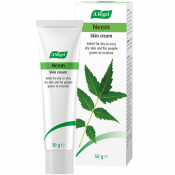The difference between dry and dehydrated skin
When it comes to your skin, the terms ‘dry’ and ‘dehydrated’ are often used interchangeably; however, they do actually refer to two distinct and separate conditions. Dry skin, for example, usually occurs when the essential oils or lipids that support your skin are stripped away, either by an external irritant or an internal problem, such as in the case of eczema.
Dehydration is different and can occur in more people as it refers to a lack of water or fluid in the outer layers of your skin. This dehydration can then go on to make your skin more vulnerable: your skin will look duller, it will feel tighter and you may become more susceptible to signs of premature ageing, such as fine lines or wrinkles. Yes, dryness can also occur, but it’s a symptom, not an underlying cause.
During summer, although your skin can be more prone to dryness, it may become at risk of dehydration too due to more prolonged sun exposure. That’s why today I’m going to take a look at a few of the key ways you can keep your skin protected from dehydration and help it retain more moisture during this difficult time.
7 tips to keep your skin hydrated
1. Drink plenty of water

When it comes to dehydrated skin, as I’ve mentioned, it usually occurs because the external layer of your skin (the epidermis and stratum corneum) lack moisture. This is why, as we will discuss, topical treatments are so important when it comes to soothing signs of dehydration, but could drinking plenty of water also help?
Well, the answer is yes and no. When you drink water, it doesn’t directly help your epidermis to retain fluid, but it can indirectly help to keep your skin cells nice and healthy which can improve the overall appearance and quality your skin. It’s also worth noting that, if you’re not drinking enough fluids, your skin will definitely suffer.
Dehydration can have an impact not just on your skin cells, but also on practically every area of your body, from your liver to your lymphatic system. This can mean that toxins and waste products won’t be getting transported away from your skin or removed from your body as efficiently. Your production of collagen will also take a hit too, causing your skin to lose its elasticity and become victim to premature ageing.
Most experts generally advise drinking between 1.5-2 litres of water a day, or 8-10 glasses of water; however, if you’re holidaying somewhere nice and hot abroad then this figure is going to need to change to reflect this increase in temperature or even your intake of alcohol! If you feel yourself becoming dizzy or you need to hydrate quickly, you could try our Balance Mineral Drink to help get you fluid levels back under control.
2 – Keep moisturising your skin

This next tip is hardly surprising, but when summer eventually does roll around the corner, it really is crucial that you’re moisturising your skin regularly. As I mentioned earlier, as important as it is to up your fluid intake, if you really want to hydrate your epidermis, then a topical cream is the best way of doing this.
However, the ingredients in this cream really matter. Summer can make your skin more vulnerable to problems like prickly heat while allergens such as pollen can run rampant at this time of year. That’s why, ideally, you want to focus on a moisturiser that contains gentle, nourishing ingredients to help lock in the moisture and soothe any irritation – aloe vera or argan oil are good options here, but it’s hard to beat neem.
Derived from the neem tree (this contains 35 biologically active constituents!), neem has natural anti-inflammatory properties and can help to ward off bacteria and fungi. These qualities make it extremely soothing, especially for skin that’s easily prone to irritation.
My Top Tip: Try applying this cream to dry, irritated skin to help relieve any inflammation, itchiness or redness. Try applying this cream to dry, irritated skin to help relieve any inflammation, itchiness or redness.
|
3. Eat plenty of fruit

Fruit, in addition to being another source of water, also has the benefit that it is incredibly rich in the nutrients your skin needs to thrive. Vitamin C, for example, can help to promote your production of collagen while antioxidants like vitamin E, help to protect your dehydrated skin from free-radical damage.
It also helps that summer just so happens to be the time of year when most of our favourite fruits are in season, such as cherries, blueberries, strawberries, mango, apricots, papaya and peaches. Take advantage of this opportunity and, if you happen to be venturing abroad, don’t be afraid to try more exotic fruits such as kumquats, dragon fruit or jackfruit.
4. Use sun cream

If your skin is dehydrated, the last thing you want to do is expose it to the sun for too long. While a little bit of sun exposure may actually benefit your skin, allowing you to synthesis plenty of vitamin D, too much can make you vulnerable to sunburn. This in turn will definitely dehydrate your skin, reducing its elasticity and making you far more vulnerable to premature ageing.
Protecting your skin from the sun is pivotal. You should be re-applying suncream regularly throughout the day if you’re spending a lot of time outdoors.
Top tip: Don’t forget to apply sun cream to your feet too, not just your face and body! Your feet are often exposed during summer but the skin here often gets overlooked which can result in painful sunburn!
5. Don’t go overboard on alcohol and caffeine

One of the reasons that summer is such a fun time of year is because most of us generally try to take things at a more relaxed pace and make a point of getting away for a few weeks. While holidays can be a great way to explore a new place or culture, often we can go a bit overboard when it comes to alcoholic beverages like cocktails, wine or cider.
In the short-term, this won’t create too many issues but if you’re going out every night, it can dehydrate your skin. Alcohol is well-known as a diuretic which means that it can cause your body to lose fluids. Combine this with scorching hot temperatures, and, not only is your skin going to suffer, but soon you will find yourself feeling fatigued, dizzy and nauseous.
Caffeine on the other hand is slightly different. If you’re abroad on holiday, a hot cup of coffee probably isn’t top of your list of drinks. That’s why iced coffees are so popular during this time and, unfortunately, these still contain plenty of caffeine (in addition to mountains of sugar!). People might be tempted to turn to iced coffee instead of water to cool down and hydrate but, again, caffeine can act as a diuretic, plus it can leach your stores of vital nutrients like magnesium or vitamin C!
Please remember my earlier advice for staying hydrated and make sure you drink plenty of water – this is doubly important if alcohol is going to be entering the equation!
6. Keep things cool

Hot showers or steamy baths might be a nice way of relaxing but they can create problems for your skin. Firstly, exposing your skin to hot water, rather than adding moisture, can subtract it, leaving your skin dehydrated. Secondly, a big problem these days is the type of water we’re exposing our skin too. You may have heard of ‘hard water’ and what this simply means is that the water contains additional components, like limestone, which can also leach water away from your epidermis.
That’s why, in the interest of keeping your skin hydrated, it might be a nice idea to try and keep things cool. Instead of turning your shower up to the highest setting, try to keep things lukewarm. This should ensure that your skin isn’t too badly affected and, after coming out of the shower, try to apply a layer of moisture just to lock any residual water in.
Top tip: Lukewarm showers aren’t just good for your skin; they can also benefit your hair too! Hot water actually opens your hair follicles, making your hair more prone to damage, plus it can also strip essential oils away too, leaving your with drier, coarser locks.
7. Invest in a humidifier
Humidifiers are often something that I often recommend investing in during the winter months but they can also be used during summer too! When you think about it, this make sense as during summer even when you’re indoors, you’re going to be exposed to either hot, dry air or recycled air from air conditioning units. Over time, this can strip the essential oils and moisture from your skin, causing irritation or even dehydration. A humidifier can rectify this problem by inserting more moisture into your environment, keeping your skin nice and moisturised.










